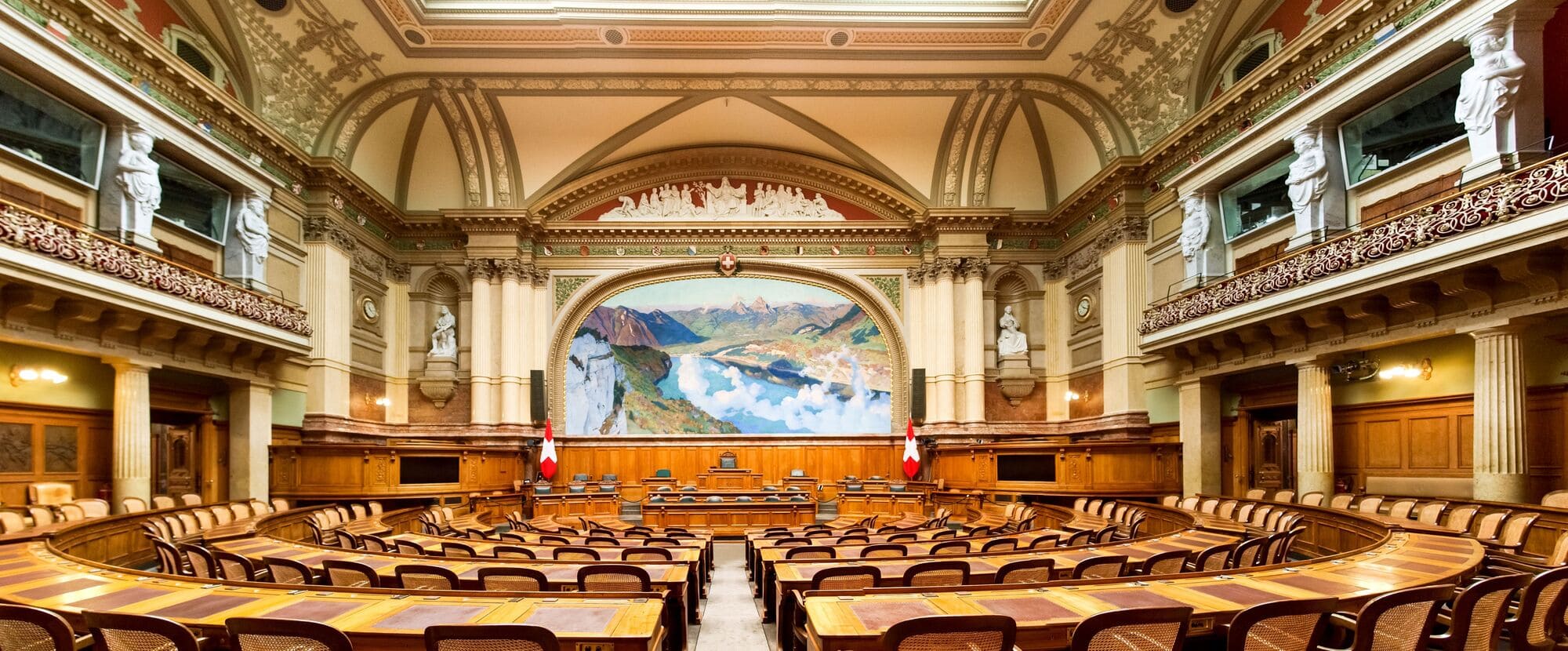Crisis-proof gold storage at Swiss Gold Safe
Additional information > Prevailing conditions for value storage in Switzerland and Liechtenstein > Switzerland/Liechtenstein: Secure gold in a crisis
Switzerland and Liechtenstein remain economically strong even in times of crisis
Global health crises and geopolitical incidents threaten national economies – yet they also challenge people and governments to create the best possible solutions. Like other nations, Switzerland and the Principality of Liechtenstein have recently had to cope with numerous crises, such as the coronavirus pandemic, the war in Ukraine, and the Credit Suisse bank takeover. Such times call for stability and reliability, essential virtues to ensure survival in a climate of uncertainty – which is why these landlocked countries are optimal locations for crisis-proof gold storage.
According to global comparisons, Switzerland and Liechtenstein are considered crisis-proof locations. This assessment takes into account the independence of these two European countries, neither of which are EU (European Union) member states. In addition, Switzerland itself is not part of the EEA (European Economic Area). Both states can therefore make their own independent decisions and choose whichever pathway their nation may wish to take. The existence of the Swiss franc as a strong, independent currency is one of many other influential features which contribute to Switzerland’s reputation as a safe haven – for its own citizens as well as for investors and other interested parties from abroad.

mojolo © - stock.adobe.com
Gold is always a popular investment in times of crisis – a fact which can be easily demonstrated by tracking the movement of the gold price over the last few years. Regardless of whether there is a health emergency, a banking crisis, or evidence of soaring inflation around the world – this valuable precious metal is always in greater demand in challenging economic times when gold is sought after as a means of asset protection. And naturally, secure storage arrangements are also essential to preserve the value of gold and other precious-metal holdings. In such circumstances, investors much prefer stable, crisis-proof locations: one reason why gold is so often stored outside the EU.
Coping with the coronavirus health crisis in Switzerland
COVID-19 prompted various attempts at containment around the world. In Switzerland, too, there were national measures ordered by the Federal Office of Public Health (BAG), such as lockdowns, temporary working from home, and a mask-wearing requirement. In general, however, these restrictions were kept to a minimum, remaining in force for as short a period as possible to avoid overburdening the population and unnecessarily restricting their basic freedoms. COVID-19 was defined as a “particularly dangerous situation” with the last measures imposed by the federal government finally lifted on 01 April, 2022. As a result, Switzerland was one of the first countries in Europe to become totally free of coronavirus restrictions.
During the winter 2020 lockdowns, travellers from home and abroad were still permitted to cross borders by land at any time. This enabled our German clients, for example, to continue to access their safe deposit boxes. Ski regions were still open and tourists were allowed to stay in Swiss hotels. However, international travel restrictions for sea and air traffic were still subject to country-specific regulations. Even in these uncertain times, Switzerland and the Principality of Liechtenstein were able to exercise some regard for their wider economic interests. Even during this major health crisis, personal property rights were always treated with uncompromising respect. And likewise, in the allied fields of political and civic administration, democratic rights continued to be granted and respected to the fullest possible extent.
Amid all these lockdowns and travel restrictions, Swiss Gold Safe’s national and international clients greatly benefited from our specialist storage services and the convenient access to our Switzerland and Liechtenstein facilities – especially as regards our segregated custody arrangements which include features such as the streamlined opening of client accounts plus convenient storage and retrieval without a physical client presence.
Crisis triggered by the war in Ukraine
The economy had hardly begun to recover from the coronavirus pandemic when the war in Ukraine began on 24 February, 2022. And though neither Switzerland nor Liechtenstein were directly involved, the Russia-Ukraine conflict has nevertheless had an impact on the economies of all European countries. Switzerland’s response was to continue to adhere to its own laws and basic values, and not allow itself to be instrumentalised.

PX Media © - stock.adobe.com
Shortly after the outbreak of war, and subject to the limitations of its own laws, the Swiss Federal Council decided to adopt the EU sanctions against Russia in order to strengthen their effect. In addition to far-reaching financial sanctions, the assets and economic resources of Russian individuals, companies and organisations were also frozen, yet these were neither confiscated, expropriated nor resold. This was the only approach which could be reconciled with Swiss law which safeguards the unrestricted preservation of personal property.
Nevertheless, the Ukraine crisis has also created a tense situation with gas, oil and electricity prices in Switzerland. Here, the federal government, cantons and relevant energy sectors worked closely together to avoid bottlenecks and secure continuity of energy supplies. Extensive measures have been launched to create adequate reserves and thus reduce Switzerland’s dependence on Russian oil and gas as much as possible. At the same time, the country’s renewable energy sector was strengthened and reserve capacities built up in power plants driven by fossil fuels (primarily oil). A further special hydropower initiative was also launched to create new permanent reservoirs and expand the capacity of existing hydro reserves.
The Credit Suisse bank rescue: averting a global crisis
Until spring 2023, the Zurich bank Credit Suisse (CS) was one of the most important financial institutions in Europe. But this grand banking institution, founded in 1856, slipped into a downward spiral as the dual result of mismanagement and various risky transactions. According to the Financial Stability Board (FSB), CS was one of the 30 world banks described as ‘systemically important’. The Financial Stabilization Council, which oversees the international financial system, concluded there was a risk that a CS failure could have a domino effect on other big banks in the international banking ecosystem. And because, in financial-world jargon, CS was considered “too big to fail”, some kind of rescue was essential.
The Swiss National Bank (SNB), the Swiss Financial Market Supervisory Authority (FINMA) and the Swiss government all supported the takeover of CS by UBS, Switzerland’s largest bank eight times larger than CS, with the help of state guarantees. Although the Swiss Federal Council had to intervene at very short notice, the correct legal procedure was observed at every stage via a review handled by the Swiss National Council and the Council of States. All communications were conducted with maximum transparency, enabling these two major Swiss banks to conclude a merger agreement whereby UBS acquired Credit Suisse. And contrary to media reports, Credit Suisse shareholders were not subjected to an expropriation, but actually received UBS shares as compensation for their securities, which had meanwhile lost their financial value. The occasionally mentioned write-off of the Additional Tier 1 bonds (AT1) was also correctly implemented under Swiss law. Even if the CS rescue was an unpleasant experience for individual investors, these measures ensured that the state (and thus the taxpayer) were not held fully liable for the losses of private investors. Find out more about expropriation risks in this article comparing emergency law in Switzerland and Liechtenstein.
A Parliamentary Commission of Inquiry (PUK) was swiftly set up to review the takeover with a view to informing and improving future processes. The 14 members of the National Council and the Council of States had the task of examining all official procedures relating to the bank merger, questioning witnesses and inspecting the minutes and documents of all Federal Council meetings. Credit Suisse’s recent history will also be reviewed as part of this evaluation. A PUK is the Swiss Parliament’s strongest instrument, and the CS-PUK is only the fifth delegation of its kind ever to be deployed. A commission of inquiry is always set up when there is a need to seek clarification on events of major importance.

Mauro Piccardi © - stock.adobe.com
Past banking crises
The last major financial crisis began in the summer of 2007. At that time, interest rates in the US real estate market rose rapidly once it became clear insolvent bank customers were defaulting on their mortgages. The direct result was the collapse of the major US Lehman Brothers bank in September 2008. This triggered a spreading worldwide crisis in which numerous banks had to be supported with loans worth billions.
There were also banking crises in Switzerland. One example is collapse of the Spar- und Leihkasse Thun (SLT) regional bank in 1991. The funds of small investors and business customers were suddenly frozen and a 14-year liquidation process began, which was not finally closed until 2006. At that time, around 6,300 bank customers lost more than a third of their assets when around CHF 223 million in savings and investments could not be reclaimed.
What happens to a safe deposit box in the event of bankruptcy?
Safe deposit box customers are often at a disadvantage during bankruptcy proceedings. During a bank resolution, safe deposit box holders often forfeit their property because the resolution authority blocks all safe-deposit access until customers’ outstanding debts are cleared. If there are banking debts – such as mortgage loans, for example – the insolvency administrator can exercise a right of retention, or a right of lien, on customers’ assets.
This banking procedure is very different from the mechanism which would apply with a private storage company. In the unlikely event of a bankruptcy, Swiss Gold Safe Ltd would be liquidated relatively quickly. This is primarily because, unlike standard banking practice, there is simply no need to maintain a complex balance sheet. Client safe deposit boxes and their contents could not be treated as Swiss Gold Safe assets. As such, the very most any bankruptcy trustee could demand would be the payment of any outstanding storage or safe deposit rental fees. Once any such outstanding fees have been paid, the bankruptcy authority must grant access to the safe deposit box or hand over the deposited goods. This safeguard is one very good reason for arranging bank-independent storage for your precious metal holdings.
Inflation during 2022 and 2023
The economic success of a country can also be measured by its annual inflation data. The war in Europe and the subsequent energy crisis caused a worldwide rise in consumer indices. In the euro zone, inflation peaked temporarily at 10.6% in autumn 2022. However, in Germany, Austria and Italy, its value climbed above 11% over the same period. Meanwhile, the US recorded 8.2%, the UK 9.6%, and warring Russia 16.6%, with Türkiye the outright leader at 85.5%. In order to contain these high inflation figures, almost all state central banks raised their key interest rate in several stages. Such key interest rates indicate the terms under which banks can borrow money from central banks. This strategy was designed to reduce consumer demand for goods and thus make prices more stable. However, loans also became more expensive and investment projects were cut back. As a result of this action, inflation figures were significantly reduced in 2023.
In Switzerland and Liechtenstein, the rate of inflation remained comparatively moderate. In August 2022, for example, Switzerland recorded a 30-year high of 3.4%, while Liechtenstein’s inflation figure peaked at 3.5%. In the following year, inflation fell back to 2.1% and 2.2% respectively. According to financial experts, the primary reason for this lower inflation is the strong Swiss franc.
Switzerland is far less dependent on fossil-fuel imports than most other European countries. The country’s energy supply is largely provided by its own hydroelectric and nuclear power plants. So high gas prices do not distort electricity prices, as tends to happen elsewhere.
To mitigate inflationary pressures, the Swiss National Bank (SNB) raised its key interest rate sharply from 2022 to 2023, taking it out of the previously negative range. Nevertheless, interest rates in Switzerland are still significantly lower than in the USA. Experts assume the SNB intends to raise interest rates further to avoid too much disparity with the EU and the USA. This would otherwise weaken the Swiss franc, making imports more expensive and thus indirectly importing inflation. Find out more about using Swiss francs as a protection against inflation.
Conclusion: Store your gold investments with Swiss Gold Safe in a crisis-proof environment
Switzerland and the Principality of Liechtenstein often take a different path to the rest of the world, especially in times of crisis. Both countries have retained their independence and maintain their own currency outside the EU. This has resulted in a high level of internal stability, a fact readily acknowledged worldwide. In these jurisdictions, the protection of property rights is firmly established and adhered to even in challenging economic environments. Thanks to the strong Swiss franc, both countries have been able to keep inflation at a reasonable level, as global comparisons have shown. These are some of the many good reasons why Switzerland is rated a safe haven for gold.
However, as past events have shown, banks can occasionally get into difficulties even in economically stable countries. That’s why we at Swiss Gold Safe recommend bank-independent storage of assets and valuables. This can be arranged via a bank-independent safe deposit box in Switzerland or a bank-independent safe deposit box in Liechtenstein, as well as via segregated individual custody in Switzerland. Swiss Gold Safe offer secure, specialist and crisis-proof storage of investment gold and other precious metals.
Switzerland and Liechtenstein: crisis-proof gold storage at a glance
- Switzerland and Liechtenstein are not members of the EU and are thus free to make their own decisions. These countries are active democracies with long-established traditions respecting individual property rights and high levels of political stability.
- These attributes allow the two countries to follow a different path, especially in times of crisis. This was evident during the coronavirus pandemic, the Ukraine war, and again during the Credit Suisse banking crisis.
- During bankruptcy procedures accompanying a banking crisis, access to customer safe deposits may be partially or totally denied – a situation which can literally drag on for years. This risk simply does not exist with the Swiss Gold Safe options.
- Even during a global increase in inflation, Switzerland and Liechtenstein were able to register much lower inflation rates after moderate adjustments to their key interest rates.
- The economic success of these countries is primarily based on a strong Swiss franc and largely independent energy supplies.

